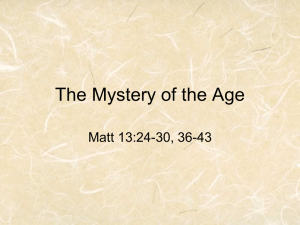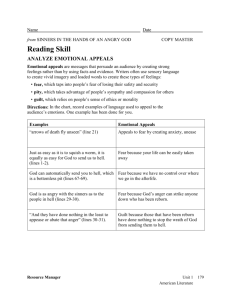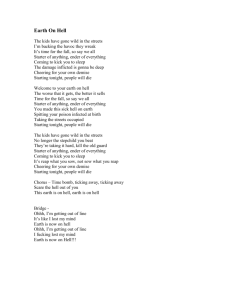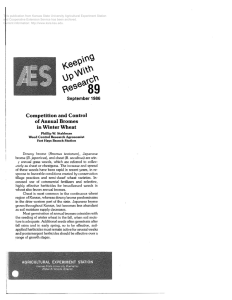Homily for July 17, 2011, 16
advertisement
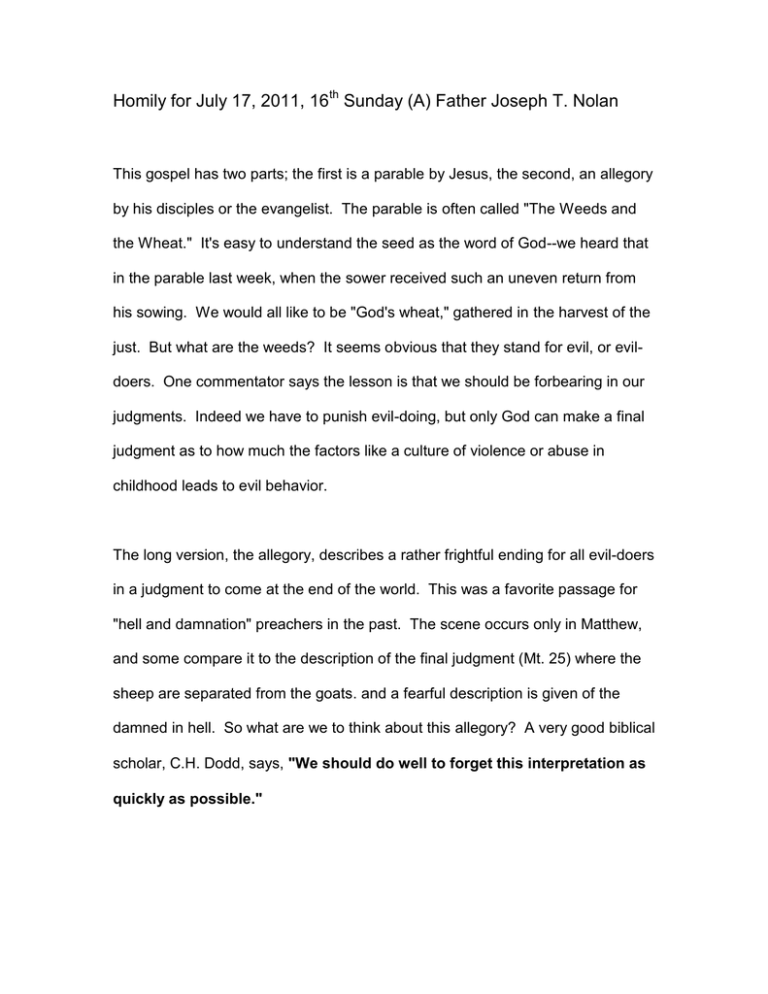
Homily for July 17, 2011, 16th Sunday (A) Father Joseph T. Nolan This gospel has two parts; the first is a parable by Jesus, the second, an allegory by his disciples or the evangelist. The parable is often called "The Weeds and the Wheat." It's easy to understand the seed as the word of God--we heard that in the parable last week, when the sower received such an uneven return from his sowing. We would all like to be "God's wheat," gathered in the harvest of the just. But what are the weeds? It seems obvious that they stand for evil, or evildoers. One commentator says the lesson is that we should be forbearing in our judgments. Indeed we have to punish evil-doing, but only God can make a final judgment as to how much the factors like a culture of violence or abuse in childhood leads to evil behavior. The long version, the allegory, describes a rather frightful ending for all evil-doers in a judgment to come at the end of the world. This was a favorite passage for "hell and damnation" preachers in the past. The scene occurs only in Matthew, and some compare it to the description of the final judgment (Mt. 25) where the sheep are separated from the goats. and a fearful description is given of the damned in hell. So what are we to think about this allegory? A very good biblical scholar, C.H. Dodd, says, "We should do well to forget this interpretation as quickly as possible." That does not mean we are free to do anything we want and never fear a judgment! But the scholar insists that there was an original meaning to this parable that we should take to heart. Jesus was speaking to peasant farmers who were very much accustomed to sowing seed by hand, and then seeing the weeds grow along with the beginning of a good crop. That happens not just with wheat but with corn, potatoes, and just about anything. Of course you try to keep down the weeds or they will smother the growth of the plants. But no farmer would hesitate to gather in the crop, even though some weeds--or “tares,” in the old translation--are still present. What point was Jesus making? That the kingdom of God is at hand, and we are its instruments, even though we are flawed instruments. Indeed--we are flawed human beings. But God chooses to work through us, and announces through Jesus that the work is imperative. A similar interpretation looks at society, more than the individual, and says the meaning is that good and evil will be present and remain in conflict until the end of the world. So we cannot look for a perfected society; it is only the Creator who will straighten out things in the end. It is not easy to accept this; we might well wonder why God created us in the first place. Is it only to lurch through history, through terrible wars and intervals of peace, building civilizations and tearing them down, until the Creator finally gives up on humans and takes over? No, we like to think that we are making some progress in becoming fully human, living as God's children. The former president of the Czech Republic, Vaclav Havel, thinks that the failure of atheism leads to a new sensitivity or opening to belief in God. He could be thinking of Russia, where the collapse of Communism has led to a surge of belief in Orthodox Christianity. Indeed they are even now completing the rebuilding of their great cathedral in Moscow. And everywhere people are seeking for baptism. There are other approaches by philosophers that seek answers to questions that are existential, profoundly human. Questions like, "Who are we? What may we hope for? Why are our sentiments about justice so strong? Why do we long for universal amity? Why should we trust reason? Why should we be moral, especially when no one is looking and no one is harmed?" We are not confronted so much with atheism as with a widely accepted secularism--a distrust of church as institution, a rejection of religion as something in the past. The questions just raised are fundamental, and we should weigh the answers given by the great religions if we are going to overcome the evil in the world and reap the harvest of a better humanity, a world at peace. The modern day prophet we quoted, Vaclav Havel, said the following in a speech one Independence Day when visiting Philadelphia: "There is an awareness of our being anchored in the earth and the universe, the awareness that we are not here alone nor for ourselves alone, but that we are an integral part of higher, 3 mysterious entities against whom it is not advisable to blaspheme." Paraphrase that last statement: we belong to God who created us, who loves us, and we should not put false gods in his place. Now what about that hell and judgment? And countless sermons in the past warning us about going to hell, weeds gathered for the burning? That’s too big a subject for today, except to say that our greatest theologian, Karl Rahner, said we must rethink or newly understand our doctrines in every new age. The images of life after death was certainly part of the culture: thus, heaven was thought of as above, in the skies, and hell as below, where indeed the volcanic fires burn. And now? Pope John Paul said, right to the point, heaven is God. He then left the details to other theologians like himself. And whatever hell Is, such as the absence of God, it is a gain that we no longer have sermons oppressing us with the fear of hell. We want to be God’s wheat, gathered in the harvest. If a barn doesn’t seem like a great image of heaven, remember that wheat is turned into bread, and bread is life-giving. And God is life. 4
